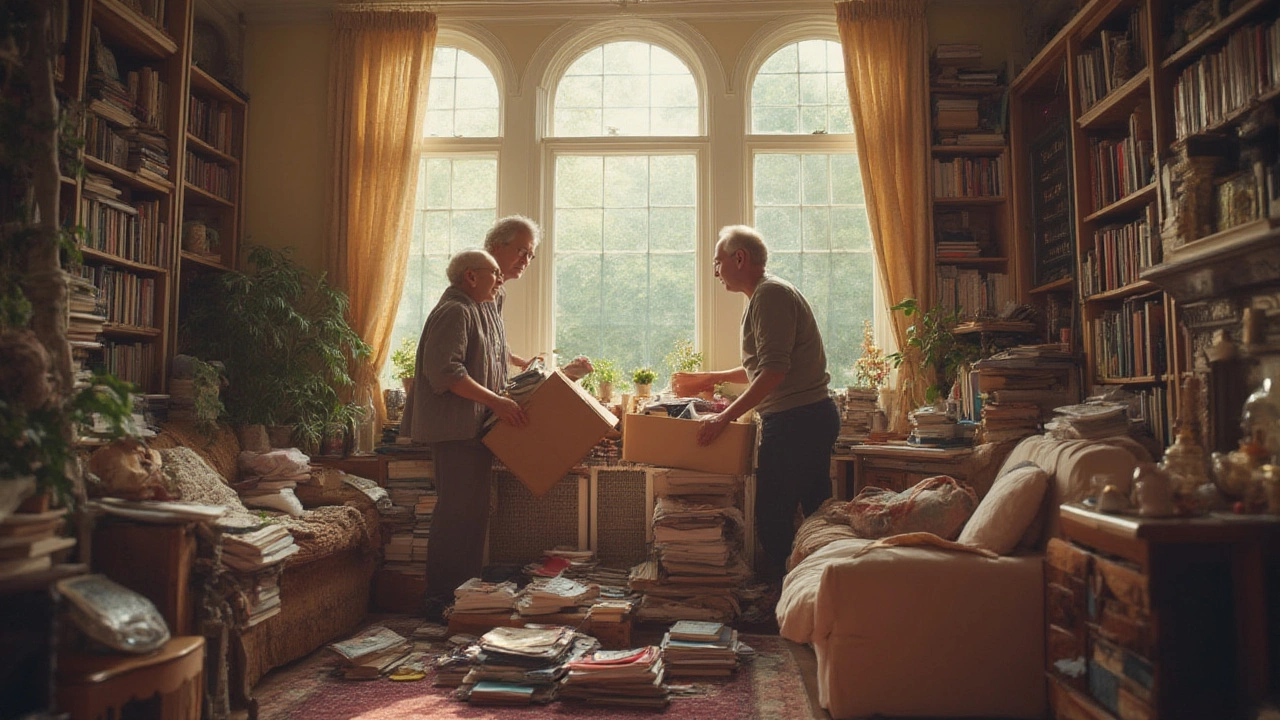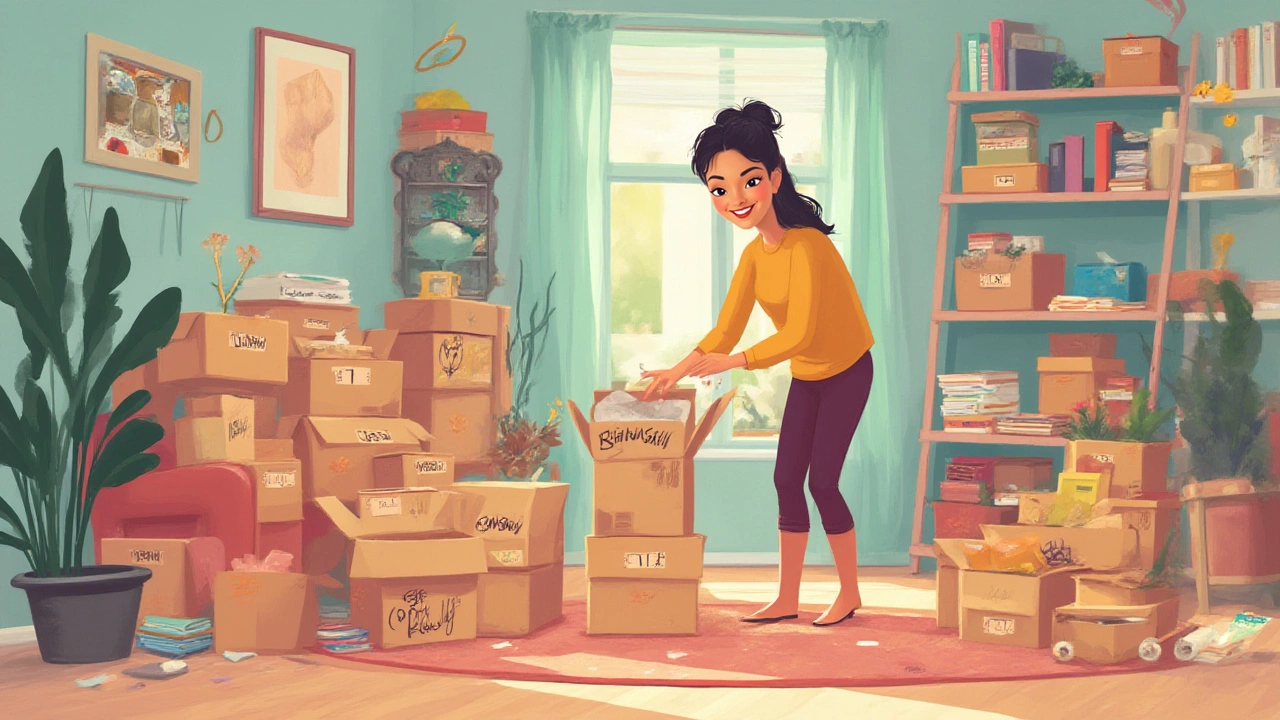Proven Ways to Declutter When You’re Overwhelmed: Stop Feeling Stuck Fast
 Jul, 4 2025
Jul, 4 2025
Your eyes land on the same pile day after day. No matter where you start, the mess swallows the room. Ever felt like clutter has sprouted roots and built a fortress? You’re nowhere near alone. A study from UCLA’s Center on Everyday Lives and Families found that 75% of surveyed families couldn’t fit their cars in the garage because of stuff. And it’s not just garages. Kitchen counters, closets, even the “junk drawer” become no-man’s-lands. It goes way beyond appearances—clutter has a proven link to stress, distraction, and even poor sleep. You already know you want less mess. The problem? Looking around, it just feels…impossible.
Why Clutter Feels Too Much—And What’s Really Going On
When every corner is stacked or buried, starting feels like choking on quicksand. And there’s real science behind that feeling. Too much visual and emotional clutter floods your brain’s processing abilities. A 2022 Princeton study proved that visual chaos eats up attention and saps working memory—so even basic decisions (like "where do I put this?") get hard. There’s also the emotional layer: we attach feelings to stuff. Toss something gifted by family? That feels like betrayal. Throw away old homework? Feels like losing a piece of yourself.
But here’s what most advice gets wrong. People say, “Just do 15 minutes a day,” as if all messes fit a timer. But real overwhelm is deeper. Sometimes, our belongings are like anchors against anxiety or reminders of a happier time. Add in guilt or fear of making the wrong decision, and it’s no wonder paralysis sets in. Plus, life keeps moving. Between work, family, and just trying to live, the pile grows while your time shrinks. The thing is, there isn’t a single reason why clutter becomes impossible—so there isn’t a single fix, either.
Some surprising facts: The average American household has over 300,000 items. (No, that’s not a typo.) Most adults admit feeling embarrassed by their clutter, and clutter has even been linked to higher levels of cortisol, the stress hormone, especially in women according to a U.C.L.A. 2009 study. Yet, having all these things often creates a false sense of security or nostalgia, making it tough to let go.
The bottom line? The "impossibility" is very real, but so is your ability to start breaking it down. Recognizing why it feels so hard—that’s not defeat; it’s the first step out.
How to Make Starting Simple (Even When You’re Burnt Out)
Forget the “just start somewhere” advice that lands like a dad joke when you’re knee-deep in chaos. If you’ve ever stalled because the thought of sorting one box means dealing with hundreds, you’re normal.
- Pick ‘visibility over volume’: Don’t bury yourself clearing out a full closet first. Choose a spot you see constantly: a nightstand, a kitchen counter. When you make progress there, you see it every day—and science shows visible wins spike dopamine, making the next step easier.
- Use a timer but don’t shoot for “done”—shoot for a shift. Set a 10-minute timer and see how many things you can deal with, trash, or move. At the end, stop, whether you’re finished or not. You’re not trying to clear all at once; you’re just breaking the mental block.
- The “trash bag tango”: Grab a bag and, in five minutes, toss anything obviously trash or that you wouldn’t want to pack if you moved next week. No sorting, no questioning, just easy choices. Stats from National Association of Productivity and Organizing Professionals say the average American wastes over 50 minutes a day looking for misplaced items—most are trash, expired, or unneeded.
- Get physical. Sometimes, motion triggers momentum. Stack similar items together (all books, all batteries, all mugs) without editing. Seeing “like with like” reduces visual noise, and new groupings make decisions easier.
- If you’re extra stuck, put on music. It sounds silly, but a Stanford report found upbeat tunes increase speed and accuracy in basic tasks—yes, even ones as boring as cleaning.
For some, company helps. Don’t aim for a spouse or roommate who’ll judge, though; choose someone kind but direct. If no one can come over, text a friend a “before” photo and send updates. Strangely, the thought of sharing progress, even virtually, keeps many going.

Turning the Impossible Into Possible: Tiny Decisions That Add Up
Here’s the truth no product label will tell you: storage bins don’t end clutter, decisions do. The trick is shrinking decisions until each feels painless enough to make. Here’s what actually helps people pare down when they’ve hit the mental brick wall:
- Set up three containers: keep, let go, and “not sure.” The “not sure” is key—it lets you off the hook for tough calls now. Research in behavioral psychology shows that deferring (without forgetting) helps lower anxiety and makes later decisions way easier.
- Use the “last used” rule. If you can’t remember the last time you used something (or wore it), it probably doesn’t need to stay. According to data from ClosetMaid, most people wear only 20% of their clothes 80% of the time.
- Reframe letting go: Instead of thinking “I’m losing,” think, “I’m giving this a second life.” Donate, recycle, or give to someone who needs it. Most cities have free swap spots or donation centers—a quick search shows how many people want the things you don’t use.
- Set a rule: one in, one out. For every new thing you bring home (a shirt, gadget, mug), one old thing goes. This isn’t just for after decluttering—it keeps clutter from creeping back.
- Make it visual. Tape up a progress chart, or take before-and-after photos—seeing wins charges up your motivation.
- Schedule “tidy time,” but stick to your energy rhythms. If you crash at night, do five minutes in the morning instead, when your brain is fresher.
Check out this breakdown on popular clutter spots:
| Clutter Zone | Percent Struggle Here | Why It Builds Up |
|---|---|---|
| Closets | 62% | Emotional attachment, invisible mess |
| Paperwork | 54% | “Just in case” thinking |
| Garage/Basement | 48% | Seldom used, sudden dumping ground |
| Kitchen Counters | 37% | No clear system, daily influx |
| Kids’ Stuff | 41% | Sentimental value, fear of waste |
Fact: People who declutter in bursts (short focused sprints) are 47% more likely to maintain a tidy space over three months, compared to those who do marathon cleaner sessions, says a 2023 study from the University of Michigan.
Sometimes, there will be days you touch nothing. That’s normal. Don’t punish yourself. Look at what’s clear instead of what’s left.
What to Do When Your Stuff Has Meaning (and You Can’t Just Toss It)
This is where “just be ruthless” advice drives people nuts. Grandma’s blanket, your kid’s first drawing, letters from that time you traveled alone—these aren’t just “stuff.” Studies show physical keepsakes light up emotional parts of our brains. They hold stories. But everything can’t stay.
- Limit to a “memory box.” Set a size—one clear bin or shoe box per person. If it fits, it stays. If it doesn’t, choose what’s most meaningful. The rest? Take a photo before parting ways, or write down the story behind it for a memory journal.
- Turn keepsakes into everyday items. Grandma’s teacup gathering dust? Use it for your keys or jewelry. Kids’ art? Frame one piece and rotate new ones in regularly. Treasured items that live in the open get seen and enjoyed, not buried under guilt in a closet.
- For inherited stuff, talk to family members. See if someone else wants to give it new life. Sometimes just knowing it stays "in the family" makes letting go possible.
- Remind yourself: the memory, not the item, matters most. Write yourself a one-sentence permission slip. "I can remember this person and still let the object go." If it feels right, read it out loud when you’re stuck.
- For especially tough items, wait. Create a “quarantine zone.” Put the thing in a box, seal it, and mark the date. If you don’t open it for six months, you’re likely ready to let go without regret.
- If you have no one to share the memories with, consider joining a local Facebook group or online decluttering forum. Sometimes, just talking through the story with others who get it makes the decision less lonely.
And when you finally set things free? Celebrate. Seriously—reward yourself with a night out, a favorite meal, or just a guilt-free chill day. That little ritual tells your brain: less can feel good, not like loss.
Messes that once seemed monumental? They will start to shrink. Not overnight, and not perfectly. But they will. Every small win counts—and before long, you’ll realize that decluttering isn’t just about cleaner rooms. It’s about lighter living, and even a little pride in what you keep, and what you finally let go.